Caffeine is what kills in those energy drinks
Contrary to what many people believe, it’s not the taurine that killed all those young people who were taking one can too many of energy drinks. It’s not even the combination caffeine+taurine; it’s the caffeine only!
One
I don’t care about those young athletes, soccer players, or whatever they are, when they suddenly drop dead for no reason, and the presumed culprit is the constant and excessive intake of energy drinks. It doesn’t have to be one of those that Give You Wings™, as there are hundreds, if not thousands, of similar brands. (BTW, one energy drink consumer argued that after ten years of drinking Red Bull, he neither had wings nor any enhanced athletic or intellectual performance.)
I don’t care of those retarded teenagers who can be seen in the evening in supermarkets, buying dozens of cans of energy drinks, or “combos” of energy drinks and spirits. I don’t understand what are they trying to do, but what they’re doing can’t be good.
The problem with such drinks is that they have the following characteristics:
- They contain 0.20%, 0.38%, or 0.40% taurine and 0.03% to 0.032% caffeine, or 32 mg caffeine per 100 ml; sometimes, the taurine is missing, but the caffeine is always there! (Possibly “reinforced” with guarana or some other crap.)
- The can sizes are 250 ml, 330 ml, 354 ml, 500 ml, but the cans that sell the best among the young retards are the 500 ml cans, each containing 150 or 160 mg caffeine!
- There are also PET-size energy drinks of 1 liter and 300 mg caffeine per recipient!
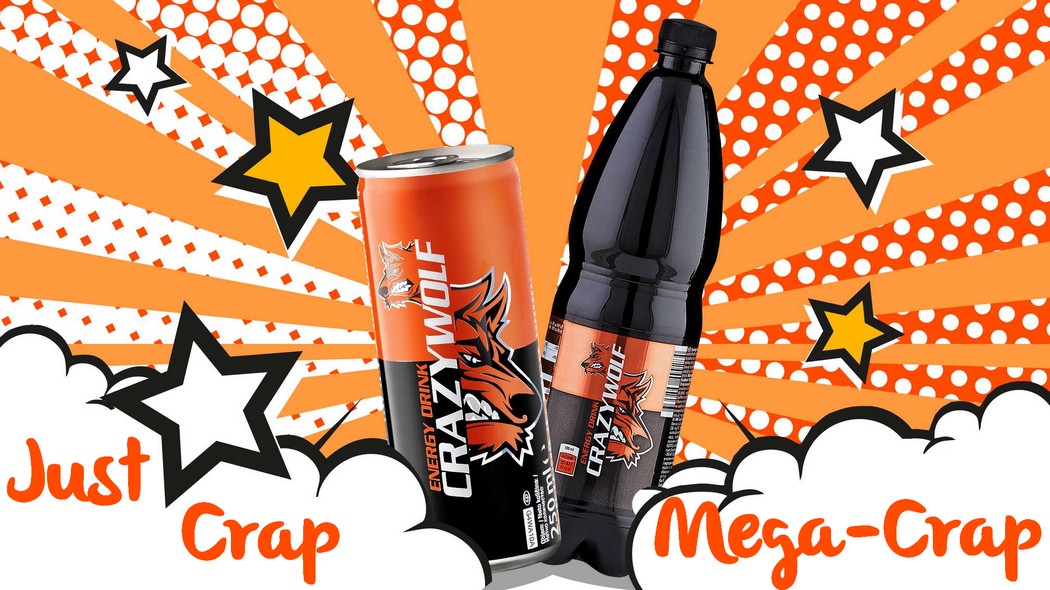
A cup of filter coffee (250 ml or 8 fl. oz.) contains on average 100 mg caffeine (especially if it’s Arabica), but it can go up to the double if it uses pure Robusta of the maximum caffeine contents. A short espresso contains 45 to 63 mg caffeine. The brewed coffees purchased in the fast food chains contain 210 to 260 mg caffeine for 12 to 14 fl. oz. Coca-Cola, Pepsi-Cola and the like contain 34-38 ml caffeine per 12 fl. oz. or 32-35 mg per 330 ml. An adult shouldn’t consume more than 400 mg caffeine per day on a regular basis, and teenagers should rather be limited to 100 mg per day.
Instead of drinking coffee, youngsters are drinking tons of “energy” shit.
Here’s how Kaufland praise their own “energy” shit (in translation):
Caffeine
Caffeine stimulates our nervous system, increases our alertness and reduces the feeling of tiredness. About 15 to 30 minutes after consumption, it develops its effect, which can last for several hours. A commercial can contains about as much caffeine as a cup of coffee. Incidentally, drinking four cups of coffee a day reduces the risk of liver cancer by 75 percent.Taurine
Taurine performs many important functions in the human body. The large amounts of taurine in our organism show that this substance is involved in numerous bodily functions. One of the most important: the building of our nervous system. That’s why, by the way, even babies receive a good dose of it with their mother’s milk. In combination with caffeine, it is therefore considered a real wake-up call.
The claims about taurine are more or less bullshit, in the sense that, while being essential to the nervous system, taurine doesn’t wake you up.
But it’s also obvious why so many retards are addicted to such crap! And I maintain that’s the caffeine overdose that kills them! Why isn’t anyone selling taurine-only “energy” drinks?
Two
👉 Let’s examine the claims concerning taurine made by a certain manufacturer of some such dietary supplements:
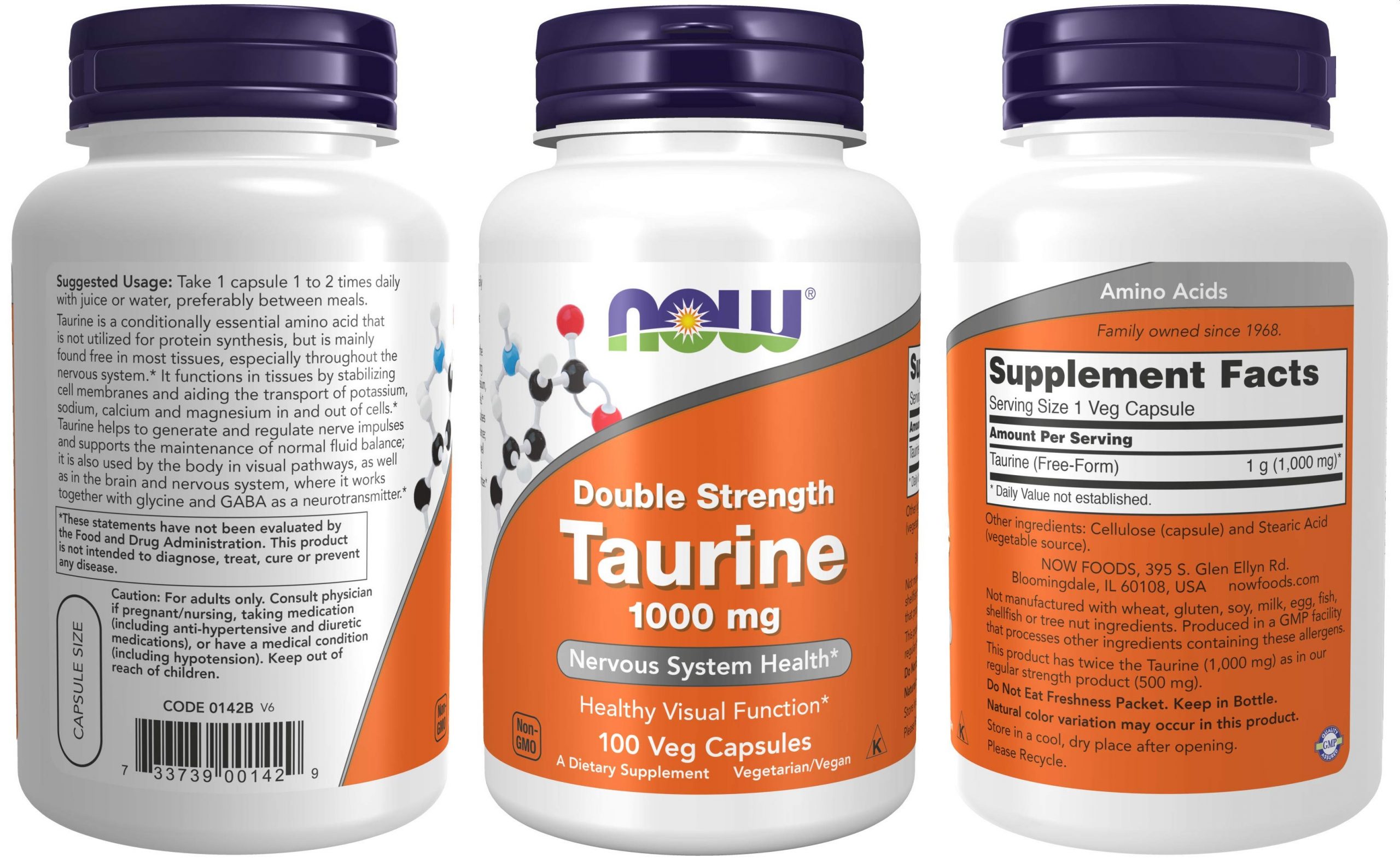
Nervous System Health*
Healthy Visual Function*
Taurine is a conditionally essential amino acid which is not utilized for protein synthesis, but is mainly found free in most tissues, especially throughout the nervous system.*
It functions in tissues by stabilizing cell membranes, aiding the transport of potassium, sodium, calcium and magnesium in and out of cells.*
Taurine helps to generate and regulate nerve impulses and aids in the maintenance of fluid balance; it is also used by the body in visual pathways, as well as in the brain and nervous system, where it works together with glycine and GABA as a neurotransmitter.*
*These statements have not been evaluated by the Food and Drug Administration. These products are not intended to diagnose, treat, cure or prevent any disease.
This is not entirely BS.
If it’s part of the transport mechanism of K, Na, Ca, Mg, then it should be able to help prevent, among others, of muscular cramps.
👉 Let’s now examine WebMD, which is generally considered to be trustworthy enough, despite some criticism. WebMD about Taurine – Uses, Side Effects, and More:
Overview
Taurine is a type of chemical called an amino sulfonic acid. It occurs naturally in the body. The best food sources are meat, fish, and eggs.
Taurine has important functions in the heart and brain. It helps support nerve growth. It might also benefit people with heart failure by lowering blood pressure and calming the nervous system. This might help prevent heart failure from becoming worse.
People take taurine for congestive heart failure (CHF) and swelling of the liver (hepatitis). It is also used for obesity, athletic performance, fatigue, diabetes, and many other conditions, but there is no good scientific evidence to support these uses.
Fair enough. Those “sportive” benefits are anecdotal, but they probably make billions to some manufacturers.
Uses & Effectiveness
Possibly Effective for
■ Heart failure and fluid build up in the body (congestive heart failure or CHF). Taking taurine by mouth seems to improve heart function, reduce symptoms, and increase the ability to exercise in people with CHF.
■ Swelling (inflammation) of the liver (hepatitis). Taking taurine by mouth might improve liver function in people with hepatitis.
Possibly Ineffective for
■ Obesity. Taking taurine by mouth doesn’t seem to reduce body weight in people who are overweight or obese.
There is interest in using taurine for a number of other purposes, but there isn’t enough reliable information to say whether it might be helpful.
Wow.
Helping people with congestive heart failure should be a huge selling point (but it isn’t).
How about the risks?
Side Effects
When taken by mouth: Taurine is commonly consumed in foods. It is possibly safe when used as a medicine for up to 3 months.
Yeah, I’ve read about studies claiming that 4,000 mg of taurine a day wouldn’t or shouldn’t be an issue.
Dosing
Taurine is found in foods such as meat, seafood, and eggs. The typical Western diet includes 40-400 mg of taurine daily. It’s also a common ingredient in energy drinks.
As medicine, taurine has most often been used by adults in doses of 6 grams by mouth daily for up to one year.
Ah, voilà.
Interactions
Lithium interacts with TAURINE: Taurine might slow down how quickly lithium is flushed out of the body. This could increase levels of lithium that stay in the body. Your healthcare provider might need to lower your dose of lithium.
Medications for high blood pressure (Antihypertensive drugs) interacts with TAURINE: Taurine might lower blood pressure. Taking taurine along with medications that lower blood pressure might cause blood pressure to go too low. Monitor your blood pressure closely.
Well, some people would LOVE to have a lower blood pressure, as long as they aren’t already taking any medication to that purpose!
👉 The best part comes with the REVIEWS on WebMD! A few selected ones:
■ 3 years ago, I developed irregular heart rate due to autoimmune thyroiditis (or maybe due to the Synthroid I have to take every day). My heartbeat was like Morse code, and had the tendency to stop for several seconds and start again, cca 20 hrs a day. I was told there was no medication for it. I found a German study online that treated older folks with taurine for the uneven beat and arginine to eliminate pauses. One year ago, I started to take a rounded teaspoon of T and a flat teaspoon of A twice a day on an empty stomach, which was a lot less than used in the study. Within 3 weeks my heart was beating normally. Just recently, I started to experiment with skipping every 3rd month, as is the recommendation for amino acids. Even during the month off my heart continued to beat normally.
■ This helps my RLS (restless legs syndrome) but must have other stuff too like B6, magnesium and glycine. Also some GABA.
■ Frequent PVCs (premature ventricular contractions) and AFib (atrial fibrillation). Take 1 gram taurine twice daily with 150mg magnesium glycinate twice daily. Now only occasional PVC with no AFib. Side-benefit is greatly improved vision — cataracts seem to be clearing.
■ Am taking for AFib, 6 grams daily with 1300 mg of magnesium and the results have been dramatic. Episodes are far less frequent and when they occur, much less severe.
■ I developed palpitations that were later defined as ectopics or PVCs. 1 gram of taurine a day almost eliminates them. I was later found to have low iron which may cause my palpitations, but even before starting iron supps the taurine cut them down and eased the anxiety associated with them.
■ Had arrhythmia for year and a half, brought on by hard triathlon training. Heard about taurine’s use on the radio. Took just 5mg each day and within six weeks all the extra beats went away, and now heart beat is back to normal.
■ I take Taurine for high blood pressure along with potassium and magnesium. It lowers my blood pressure and my cholesterol as well. My cholesterol dropped from 234 down to 185. I was taking 250mg a day. I don’t want my cholesterol to drop too low so I’m backing off a little.
■ I have had hypertension for the past 20 years and very sensitive to blood pressure medications, the result being over the years there are fewer medications that I can tolerate, this is further aggravated by my allergy to all dies and food colorings. Taurine has reduced my blood pressure to well within the levels that my doctor finds acceptable, the only side effect being that I feel much better than I have in several years.
■ I tried a zero calorie tall energy drink, silver can, 3 servings in it, but drank it all. In two hours my blood pressure that had been 150/88 for 4 months, now was 121/77. I waited a few hours more and it still was good. Taurine was near the top of ingredients, and I believe this helped me, so will buy some Taurine to give it more of a daily test as energy drinks are expensive. If I can control my blood pressure with a supplement instead of medication, it’d be a real bonus.
I’m puzzled about the last guy, with the energy drinks that definitely contained caffeine, but as a general rule, the testimonials prove effectiveness in:
- arrhythmia, atrial fibrillation, premature ventricular contractions, palpitations
- high blood pressure aka hypertension
In one case, improved vision. Was that guy a cat? 🐱 Cats require large quantities of taurine in their daily diet, otherwise they’d get blind or have a heart failure!
👉 Now, I selected some comments from Amazon Deutschland. The positive one reported:
- Improvements in tinnitus (ringing in the ears) and hearing issues.
- Good for anxiety and for improving the sleep patterns.
- Heart palpitations (PACs/PVCs: premature atrial contractions, premature ventricular contractions) and tachycardia.
The negative ones reported side effects:
- Tachycardia and sweating.
- Nausea, itching and headaches.
- Some discomfort in people with kidney diseases.
The first side effect is surprising, but even with the best medicines you’ll find things like “this painkiller might give you headaches” and “this product meant to prevent a heart failure may produce a heart failure in some people”!
👉 Last, a few comments from DocMorris.de:
60-69 years old: Product was recommended to me by my family doctor and I am extremely satisfied with it. I am currently on a Dr. Worms liver diet and it is very effective in this context.
50-59 years old: The product is a good choice! My naturopath or complementary doctor prescribed this to me.
30-39 years old: Great. Helps me stay focused in my daily work.
👉 A very last point, a rhetorical question: from the product labels shown below, can you tell which product is developed for those retards who also take harmful quantities of “muscle-building” shitty powder products, and who resonate to the term testosterone?

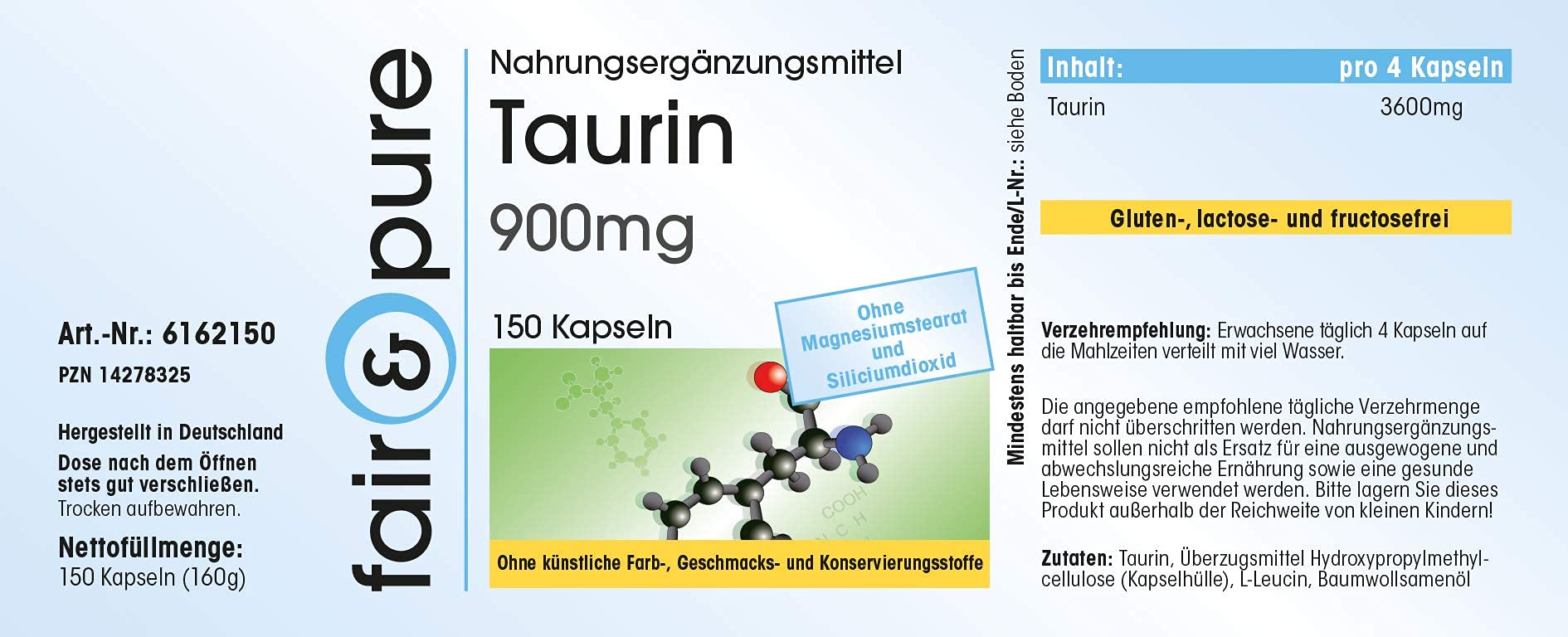
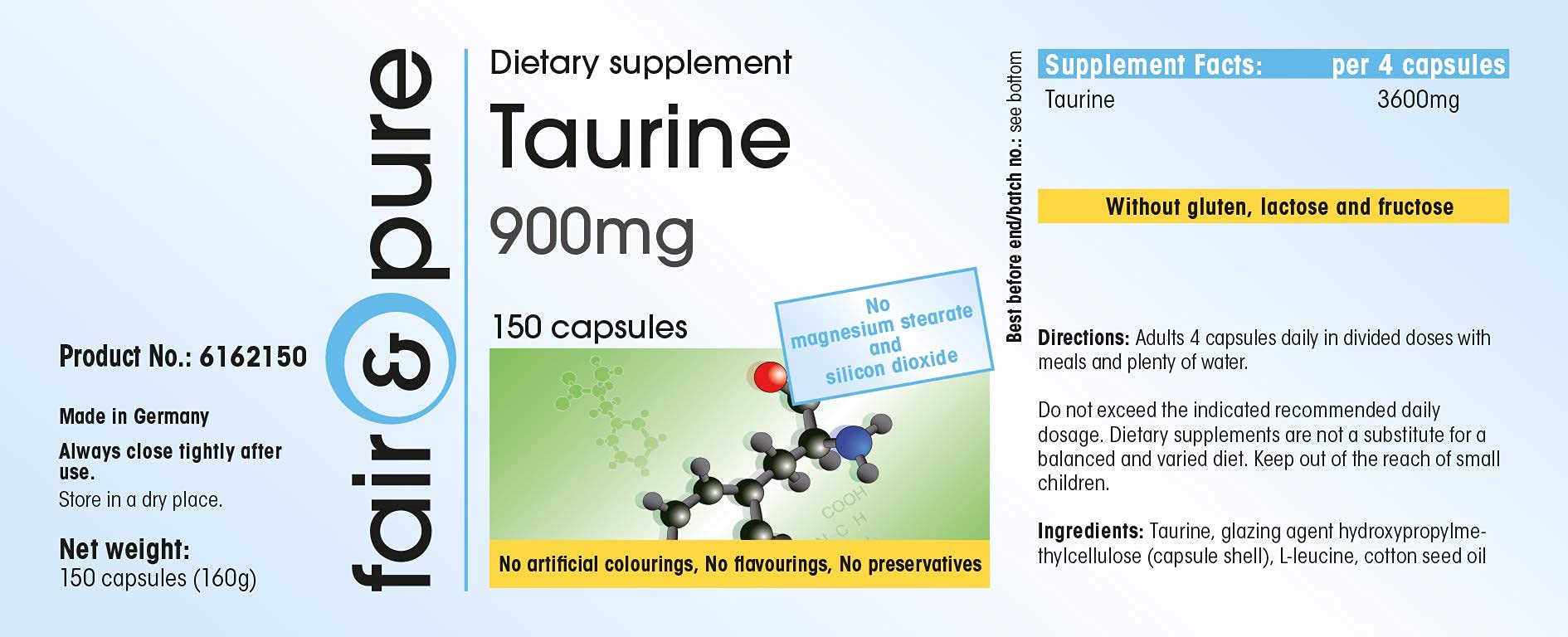
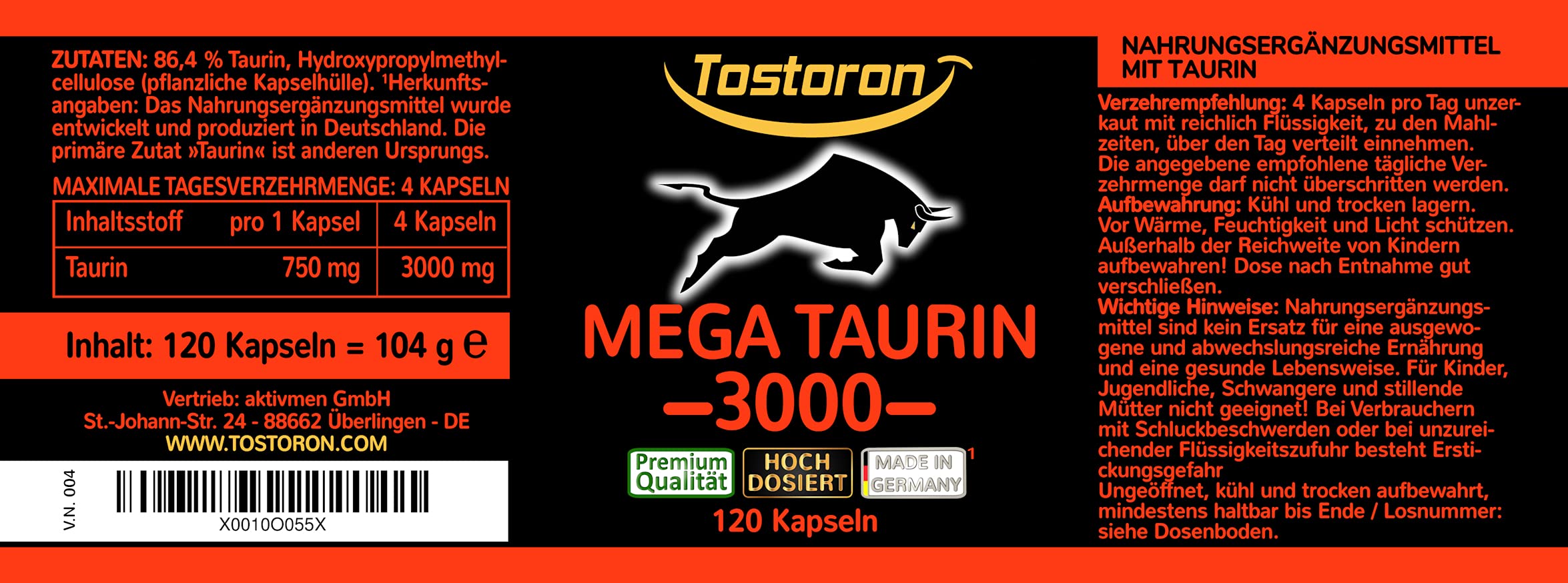
Three and last
👉 Why aren’t taurine-only drinks available in supermarkets? (For what I know, they aren’t even manufactured!)
👉 Why aren’t taurine pills available in supermarkets and drugstores? (By drugstore, I don’t mean a pharmacy or a chemist’s, but something like the German network dm.)
👉 Why isn’t taurine better studied and then marketed the way other common vitamins and supplements are, especially as it might help at least with:
- Heart problems: various arrhythmias.
- Heart problems: congestive heart failure.
- Heart problems: high blood pressure.
So far, my answer tends to be: because THEY (the powers that be) are stupid and malevolent.
Devil’s advocate: If taurine does this and that, how come it couldn’t prevent those young people to die from too much caffeine? After all, those energy drinks contained caffeine and taurine!
Well, I guess it’s too late to ask Radio Yerevan…

La taurine est un acide aminé abondamment présent dans le cerveau, qui contrairement aux idées reçues n’est pas un excitant.
La taurine, halte aux idées reçues
Non, la taurine n’est pas un excitant ! Contrairement à une idée répandue, il s’agit en réalité d’un acide aminé « non essentiel » (c’est-à-dire que l’organisme sait le fabriquer), abondamment présent dans notre cerveau et indispensable lors de tensions mentales et d’efforts intellectuels importants.
Elle permettrait l’activation des vitamines B qui sont particulièrement impliquées en cas de tensions et d’efforts, et améliorerait l’incorporation intracellulaire de magnésium.
Ainsi, à l’inverse de l’idée reçue qui assimile la taurine à un excitant, elle a au contraire un rôle de neurotransmetteur et neuromodulateur en tant qu’inhibitrice du système nerveux central.
(si vous le souhaitez, vous pouvez traduire ceci en anglais 😉 )
En fait, les toutes premières trois articles que j’ai lus à ce sujet étaient :
■ Le Journal des Femmes : Fiche Nutrition : Taurine : les effets secondaires
■ Institut national de santé publique du Québec : La taurine et les boissons énergisantes
■ Taurine : qu’est-ce qu’il faut savoir sur cet acide aminé ? – JeVaisMieuxMerci.com
Further links about taurine:
■ Mayo Clinic: Taurine is an ingredient in many energy drinks. Is taurine safe?
■ Life Extension Magazine: Benefits of Taurine
■ Poliquin Group: Ten Benefits of Taurine
■ SECOM: Taurina protejeaza creierul, inima si ochii
■ SECOM: Glosar: Taurina
■ SECOM: Jarrow’s Taurine